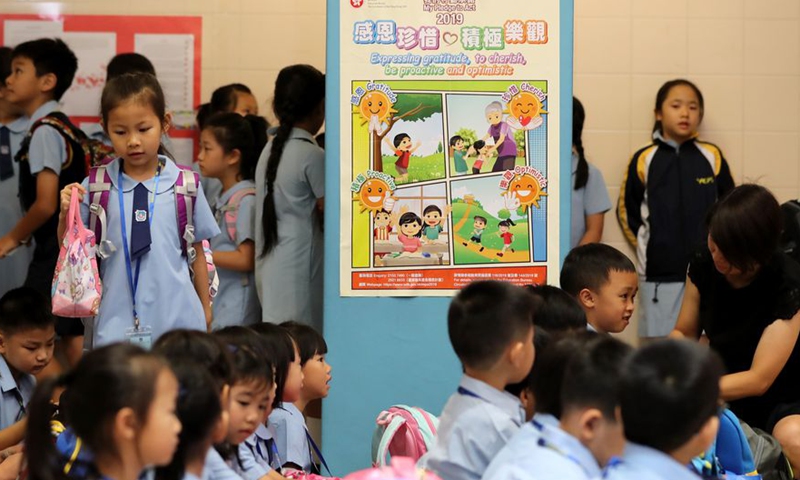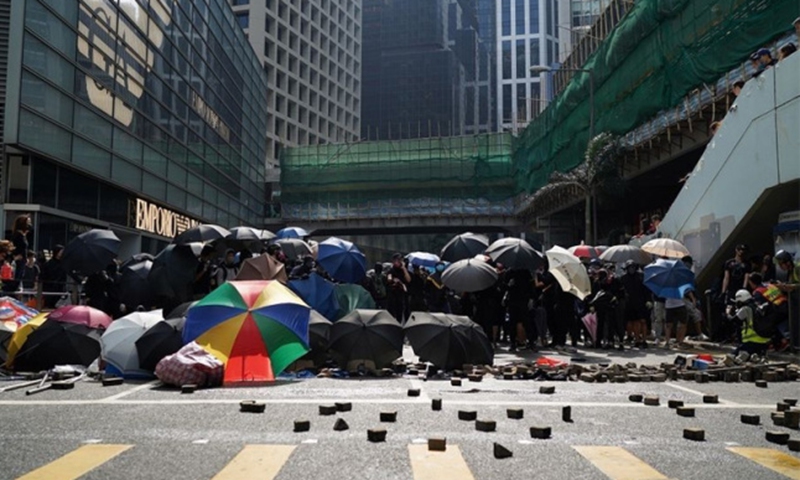Education cultivates ‘soil,’security bill eliminates ‘weeds’ for ‘one country, two systems’
By Chen Qingqing Source:Global Times Published: 2020/6/12 23:48:40

Children attend an event marking the new semester at Yaumati Catholic Primary School in south China's Hong Kong, Sept. 2, 2019.Photo:Xinhua
Such a move also echoes the demand of most parents of Hong Kong, as they do not tolerate opposition and extreme forces from "kidnapping" students for political ends, observers and representatives from those sectors said.
The Liaison Office of the Central People's Government in the Hong Kong SAR and Hong Kong and Macao Affairs Office of the State Council released statements urging "cutting off" the black hands behind the anti-government movement and saving Hong Kong children, which shows that central and local authorities would take necessary measures to help local campuses "de-politicize" and work on some deeply-rooted problems, especially on ideology, observers said.
"More and more parents in Hong Kong are rejecting the 'Hong Kong-style' Culture Revolution, and their confidence in the local education system has been shaken amid the social turmoil, hoping that local educators and schools would stick to the roles that they should have played," Lawrence Tang Fei, a member of the Chinese Association of Hong Kong and Macao Studies, told the Global Times on Friday.
Joshua Wong Chi-fung, an anti-government protest activist, and Isaac Cheng Ka Long, who helped plot a strike-vote plan for June 14 backed by radical group Demosisto to defy the national security law, have been identified as key people in the statements of central authorities as they continued to commit crimes by instigating Hong Kong youth and using them as "ammunition" and "tools" against the national security law. "Such evil hearts and despicable acts would add another record to their history of crimes," read the office's statement.
The liaison office also released a similar message to the public on Friday, claiming to firmly support the Hong Kong SAR in establishing and improving its education system in line with "one country, two systems." It pointed out that Hong Kong's hard-won success and prosperity are based on talent. However, some political forces driven by ulterior motivations have spared no efforts to bring politics to the campus, which severely affected normal teaching and studying activities.
"Save the children, save education and save Hong Kong" has become an urgent call that needs society's attention, the liaison office said.
"Education and national security are two pivot points of overall governance in order to adapt to 'one country, two systems,' which both need to gradually push forward," Tian Feilong, an associate professor at the Law School of Beihang University, told the Global Times on Friday.

Rioters block the traffic in Central District of China's Hong Kong, Nov. 12, 2019. Photo:Xinhua
Full-scale reformsThose messages from top authorities to further enhance core values among Hong Kong educators and students in line with the Basic Law and "one country, two systems" surfaced when the local education authority began pushing for local education reforms in an unprecedented manner, some observers said. More detailed requirements are expected to be released in the coming months on various aspects, including a code of conduct for professionals, national security education training, and the creation of a normal social environment for mindset changing.
Months-long social turmoil triggered by anti-government protests since June 2019 have exposed serious problems in the local education system, as official data revealed that among 8,986 protesters arrested by the Hong Kong Police Force from June 9, 2019 to May 31, 2020, 3,666 were students. They were allegedly involved in riots, illegal assemblies, criminal vandalism, assault on police, and possession of offensive weapons. Some 692 of them had been prosecuted.
More people continue to wonder what make young students in Hong Kong confused between right and wrong, with hatred-filled minds that drive them to become so violent and cruel, taking part in confrontations with their own countrymen.
Following a series of school strikes in 2019, particularly after black-clad protesters besieged Hong Kong Polytechnic University last November and turned the campus into a warzone, a growing number of parents, schoolteachers and observers called for deep reflection on the city's flawed national education.
The latest controversy was sparked by a history exam question that asked students whether Japan's invasion of China did more good than harm. It sparked a backlash in Hong Kong society and reflected the urgency of eliminating deep-rooted ideological problems that go against not only professional ethics but also the Basic Law and "one country, two systems," analysts said.
More parents worry schools would be transformed into dangerous and radical arenas for politics instead of a place for students to learn and exchange diverse views, the Global Times learned after talking to some Hong Kong parents and school teachers, who support practical changes to "purify" schools and "let students be students."
Detailed measures
The draft decision to formulate the national security law for Hong Kong also states that the Hong Kong SAR chief executive must regularly report to the central government on the SAR's performance on safeguarding national security, carry out national security education, and forbid acts which endanger national security.
A new version of a code of conduct for local teachers is being revised and will soon released with more detailed professional ethics requirements, Tang noted. "In other words, what can be done and what can't be done on campus," he said. He added that instigating school strikes or defaming the national anthem won't be allowed.
Carrie Lam, the chief executive of the Hong Kong SAR government, signed the National Anthem Ordinance, which was passed by the Legislative Council last week and came into effect on Friday. It's part of broader efforts to enhance understanding among Hong Kong's young generation on national history and spirit.
"For example, if students continue making abusive gestures during the national anthem ceremony next time, teachers have to step in and correct such behavior, or allow the police to step in," Tang said.
Other ideology-related sectors like media also face deepening reforms to implement the correct values on matters involving national identity, sovereignty and national security.
RTHK deputy director Chan Man-kuen recently resigned and will leave RTHK in September, which sparked various speculations. Some pro-West media agencies in Hong Kong distorted the Hong Kong law enforcement narrative in 2019, misleading public opinion and fueling the riots.
Some media have even become rioters' accomplices, as so-called journalists on the ground helped hinder the police in the process of law enforcement, verbally attacked police and government officers who did not agree with them, and sent police-related information to frontline rioters.
"Hong Kong society has high expectations for the upcoming national security law. However, enforcing one law can't solve every problem," Tang said, noting that the law would help create a fair environment for some people to progressively change their mindset from radical to neutral.
Newspaper headline: HK deepens ideology reform
Posted in: HK/MACAO/TAIWAN